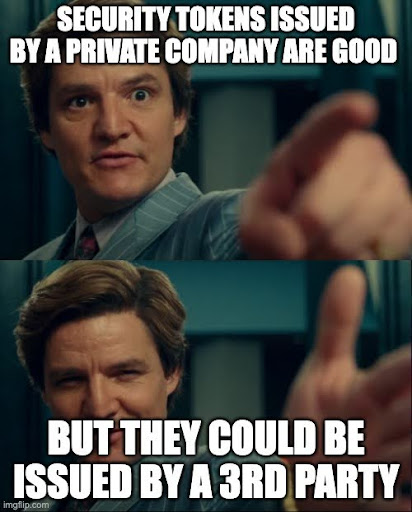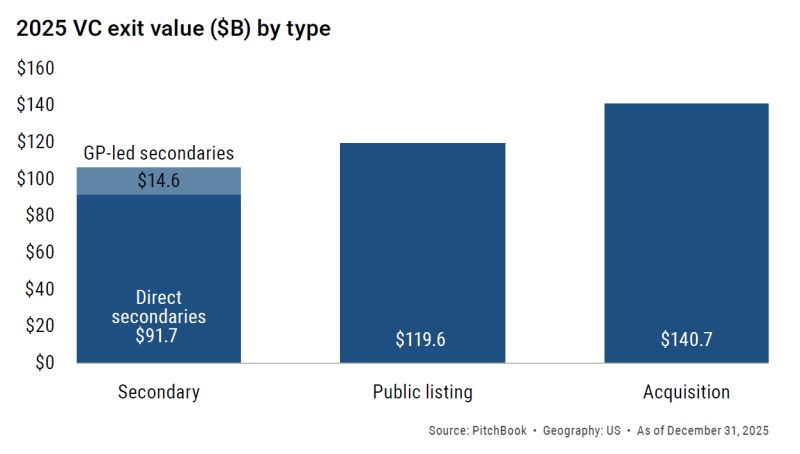
There's been a lot of talk about the tokenization of real-world assets in recent months. The growth of security tokens could have a big impact on many aspects of investing, including private equity markets. This deeper look at the role of tokenization in secondary markets explores where tokenized models are actually gaining traction — and where they still fall short. Under a pro-crypto administration, regulators are looking for ways to innovate, take their foot off the brakes, and actively encourage tokenized collateral.
The idea of tokenization is that ownership of almost anything — including art, equities, and property — can be recorded on the blockchain. But the difficulty is that a blockchain security token may not carry the same rights as actual ownership. Case in point? Third parties can issue tokenized versions of private company equity without permission from the company itself.
For investors and top pre-IPO companies, there's a lot to digest. Understanding the difference between utility tokens and security tokens is a good place to start.
Key differences between utility and security tokens
Hold onto your (cowboy) hats, folks, because understanding the difference between utility and security tokens means entering the wild west of cryptocurrency. These tokens all use the blockchain. But what differentiates them is the token's purpose, and the rights it gives the person who holds it.
Utility tokens
Utility tokens are a type of cryptocurrency that give the holder access to services on the blockchain. For example, Ethereum (ETH) tokens are used to pay transaction fees on its ecosystem, among other things. Investors who hold Ethereum tokens do not own any part of the foundation behind it.
The regulatory debate surrounding utility tokens is still ongoing, but broadly speaking, regulators treat them as commodities. That means issuers and exchanges don't have to follow the same rules as companies that offer securities as investments.
Security tokens
Security tokens represent legal ownership in real-world assets, including shares in a company. By recording the ownership record on the blockchain, the idea is that transactions are more secure. These tokens can be bought and sold with low transaction fees at any time of the day.
According to 2025 guidance, the U.S. Securities and Exchange Commission classifies security tokens as equity securities, meaning they should adhere to the same regulations as other investments. Security tokens can be issued directly by a company, but they may also be issued by third parties.
Risks of misunderstanding what you’re buying
The difficulty is that the whole field of tokenization is evolving. Regulations are unclear, at best.
This puts the onus on investors to understand what they are buying and how the tokens are supported. Some (but, notably, not all) security tokens are backed 1:1 by actual shares. Others, such as synthetic security tokens, simulate the value of an asset — but issuers do not hold it in reserve.
For those navigating later-stage deals, this guide to late-stage private companies explores key factors that can impact valuation and liquidity — especially relevant when tokenization enters the picture.
Robinhood’s tokenized share offering includes over 200 tokenized U.S. stocks and ETFs for European investors, with tokens designed to track the performance of the underlying shares. Depending on the issuer and platform, token holders may be eligible for dividend-equivalent distributions, and token prices seek to track the value of the underlying assets but can differ.
So far, so good. But the firm also launched security tokens for two private companies: OpenAI and SpaceX. Here's where things get murkier. OpenAI subsequently posted on X, stating it had nothing to do with the token, and that any transfer of OpenAI equity requires its approval. "We did not partner with Robinhood, were not involved in this, and do not endorse it."
Robinhood says its private stock tokens are financial derivative contracts that track the price of the shares. Moreover, it is using a Special Purpose Vehicle (SPV) that holds OpenAI convertible notes, rather than actual equity in the company. Dig into the terms and conditions further, and you'll find that its private stock tokens may never be redeemable or tradeable.
This example highlights both the potential applications and the material risks of tokenized shares, underscoring the need for careful due diligence before participating.
How Augment ensures real ownership and investor protection
If you're an accredited investor looking for a way to invest in pre-IPO companies (or a shareholder in a private company who wants to sell) you don't need to brave the heightened risk profile of security tokens or other tokenized assets.
Secondary marketplaces like Augment* are also transforming private equity.
As companies stay private for longer, it's understandable that early-stage investors, founders, and employees may want ways to unlock liquidity. There's also a growing number of investors who want to access early-stage companies. Private stock marketplaces help people buy and sell the underlying assets, not just tokenized versions of them, in a legally compliant way.
This comparison of top pre-IPO investment platforms can help investors vet secondary marketplaces that offer real equity, not synthetic tokens.
Augment is registered with the Financial Industry Regulatory Authority (FINRA) and the Securities Investor Protection Corporation (SIPC). It offers a transparent way to trade non-listed companies. Investors can access real-time data and interact with verified sellers. For startups, this pre-IPO investment platform puts them in control of secondary equity sales. Unlike security tokens that may be issued without their approval, issuers can approve any trades on the platform.
Tokenization is an exciting development that could change the way we own assets online. But it is early days, and many aspects remain unclear. For example, what investor protections are in place if the company that issues a token goes bankrupt? How will token issuers follow investment laws if they don't have any connections to the security tokens they issued? And what rights does a security token actually give you?
Just as you wouldn't want to drive on the interstate in a car that hadn't been fully tested, it's worth thinking twice before putting your money into assets where the ownership, rights, and regulations are still evolving — particularly when private secondary marketplaces already offer true ownership, in a tried-and-tested format.
*Securities transactions are executed on Augment Capital, LLC's ATS and offered through Augment Capital, LLC (member FINRA/SIPC).
Important Disclosures: Investing in private securities involves substantial risk, including the potential loss of principal. Private securities are typically illiquid, have limited pricing transparency, and often require longer holding periods. These investments are available exclusively to qualified accredited investors and offer no guarantee of returns. Additionally, past performance of private securities does not indicate or predict future results.
FOR ACCREDITED INVESTORS ONLY: Under federal securities laws, private market investments on this platform are available exclusively to Accredited Investors. Verification of status required before investing. Private investments involve significant risks including illiquidity, potential loss of principal, and limited disclosure requirements. "Augment" refers to Augment Markets, Inc. and its affiliates. Augment Markets, Inc. is a technology company offering software and data services. Investment advisory services are offered through Augment Advisors, LLC, an SEC-registered investment adviser. Brokerage services are offered through Augment Capital, LLC, an affiliated broker-dealer and member FINRA/SIPC. Registration with the SEC does not imply a certain level of skill or training. Neither Augment Advisors, LLC nor Augment Capital, LLC provide legal or tax advice; consult your attorney or tax professional regarding your specific situation. For additional information, please refer to Augment Advisors, LLC’s Form ADV Part 2A (Firm Brochure) and FINRA BrokerCheck.







